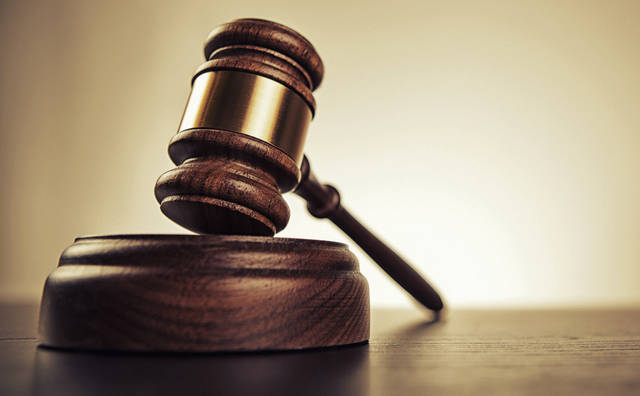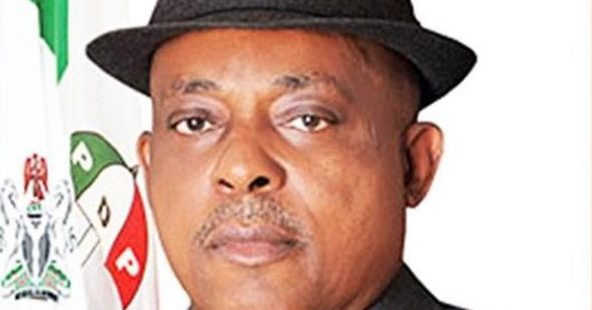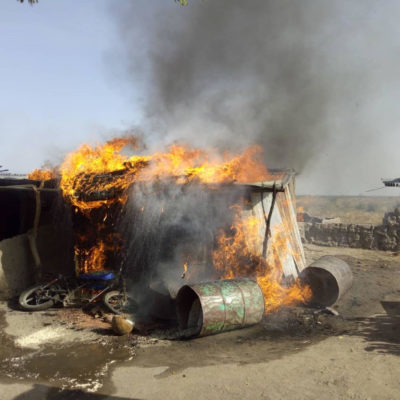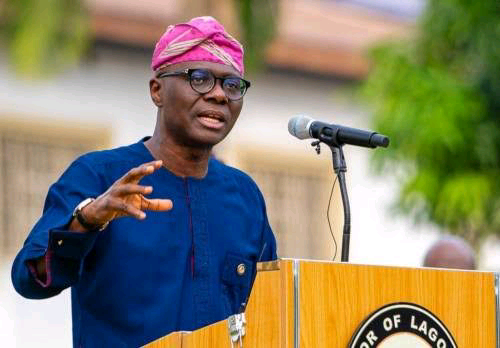After months of buck-passing and denials, Sakina Aregbesola, daughter-in-law to the Osun State Governor, Rauf Aregbesola, has apologised for plagiarising the work of Bill Hansen and Umma Aliyu.
Mrs. Aregbesola was found to have lifted materials from the article, “Fanon, the Wretched and Boko Haram,” published by Professors Hansen and Aliyu in the Journal of Asian and African Studies (JAAS).
Mr. Hansen is an assistant professor and chair of the Department of Political and International Studies, American University of Nigeria (AUN), Yola, Adamawa State.
The co-author, Mrs. Aliyu is a professor of Hausa Language at the Institute of Asian and African Studies at the University of Hamburg, Germany.
The duo had in 2013 published a researched work to underscore the relevance of the work of Frantz Fanon, an Afro-French revolutionary and psychiatrist, who developed a theory on how and why the socially marginalised, the abused, the dregs of humanity, eventually rose up in an attempt to reclaim their lost humanity.
Fanon’s political writings dealt primarily with the colonial situation, the coloniser and the colonised and the question of race, especially as it unfolded in the Algerian war for independence (1954–62).
In their work, the two authors used Fanon’s concept of the ‘wretched’ to explain the emergence of Boko Haram in a post-colonial Nigeria in which the issue of a ‘racial foreigner’ is irrelevant and pushed for the continued relevance of Fanonist thinking.
However, in the course of research, a NEXT EDITION reporter stumbled on an article by Mrs. Aregbesola in The Republic, which the operators say is a bimonthly magazine of socio-economic and political commentary, criticism and cultural discourse that explores the world as Nigerian.
In the controversial work, Mrs. Aregbesola lifted sumptuously from the Professors Hansen and Aliyu’s article but failed to offer appropriate credits as required by the law and academic tradition.
When his attention was drawn to the publication, Mr. Hansen wrote immediately to the Editor of the Nigerian journal, Wale Lawal, demanding an acknowledgement of plagiarism and a public apology.
Instead of admitting plagiarism was committed and an apology tendered, Mr. Lawal went on rigmarole of blame-shading for 11 straight weeks, a situation which prompted Mr. Hansen, Mrs. Aliyu and Nigel Gibson, the editor of JAAS, to consider a lawsuit.
Acknowledging the complaints from the authors, Mr. Lawal on November 20, 2017, wrote back to say the journal found no case of plagiarism against Mrs. Aregbesola.
“After a careful review of the issues surrounding Ms Aregbesola’s essay, we, The Republic, have made our final decision regarding the essay,” Mr. Lawal indicated.
“In the past week, we were able to locate the original essay the author sent to us. In the original essay, the paragraphs of concern were, indeed, referenced with the source materials cited in an extensive bibliography.
“It was, in short, a standard academic essay. As a result, it would be dishonest of us to accuse the author of plagiarism. Instead, we believe the fault was ours.
“In editing essay submissions for an online, general audience, our editors typically convert authors’ references to links (by embedding links and pop-ups into keywords) or by inserting comments on the source materials within their essays (e.g. “As argued by xxxx in his/her essay xxxxx”).
“Unfortunately, our editors did not do so correctly in those paragraphs. Indeed, this was a significant error on our part, made even more glaring when we revisited the author’s original essay and found she had made the appropriate references.
“For this error, for the inconvenience, it has caused you, we sincerely apologise. We understand and respect your position on the issue, but we cannot shirk from the consequences of our editors’ actions nor can we sit back while the author unfairly bears the responsibility of our grave editorial error. I must reiterate that reference-wise, the essay we published online was not what the author had originally submitted. We have expressed our apologies to the author as well, and are taking steps to ensure this kind of incident does not occur again.
“We will be publishing an amended essay (in line with the author’s wishes), as well as a public apology and acknowledgement of our glaring error. Below, you will also find the author’s comments on the issue (in her response she refers to the essay she originally submitted to us).
“The essay was one of the first essays we published, and I assure you our editorial process has significantly improved since then.
“Once again, on behalf of The Republic, I apologise for the inconvenience we have caused you these past few days. I thank you for your patience with us. We have taken this incident as a serious lesson about what further improvements we need to make regarding our editorial process and policies,” Mr. Lawal wrote.
Responding to Mr. Lawal’s letter, Mr. Hansen on behalf of his co-author and editor replied, “Your apology is unacceptable until you do what I (we) initially asked; a public acknowledgement and apology in the journal in which the plagiarism initially appeared.”
Following the rejection, Mr. Lawal immediately published an apology on “The Republic” and admitted an offence of plagiarism had been committed by Mrs. Aregbesola.
On her part, Mrs. Aregbesola in a personal apology to Mr. Hansen and the others said she had sought for independent opinions on whether what she did amounted to plagiarism when her attention was drawn to the issue.
“After being made aware of the complaint about the article published, I began sourcing for independent opinions about whether or not plagiarism had taken place,” she wrote.
“This was necessary because, at the time, I wasn’t sure it had been (as was clear in the previous email I forwarded through the journal). However, I’ve received feedback from multiple sources now that I was indeed in the wrong and you were all right.
“Therefore, there is nothing left for me to do but to apologize immediately and acknowledge the error of my ways. I cannot lay claim to the ideas in the disputed part of the piece and I now understand that this is what it appeared like.
“As for the issue of intent and deliberate passing off of your ideas as mine, I will reiterate that this was never what I set out to do and once more, I take responsibility and apologize for the entire situation.
“I believe the article has already been taken offline. This was the first step taken when this issue was raised and though temporary then, the removal of the piece will now be a permanent resolution.”
Mrs. Aregbesola noted that none of the parties at “The Republic” tried to use a privileged position to undermine the rights of the authors of the work she copied.
“As to your point of this being the case of the powerful trying to steal from the powerless, Dr Hansen, I would like to assure you that there is no such dynamic at play,” Mrs. Aregbesola continued.
“Rather, I would strongly encourage we see this as a case of mistakes made by an individual who, clearly shown the error of her ways, is remorseful and has apologized repeatedly. Indeed, if anyone holds any intellectual or moral standing in this case, you’ve clearly shown that it is you. I, on the other hand, possess none.
“At this point, I acknowledge once more that with respect to the essay, I was indeed very wrong. It has been taken down, I apologize once more. At this point, I will take my leave from this conversation hopeful that it has been resolved. I wish you all the best in your future endeavours.”
In his final response to Mr. Lawal and Mrs. Aregbesola’s apologies, Mr. Hansen said while “shadings” of mitigation still remained, he and his colleagues felt the initial demands have been satisfied.
“I have heard from both Umma Aliyu and Nigel Gibson with regard to Ms Badamasuiy’s admission of, and apology for plagiarizing our piece in JAAS, 48 (3) 2013,” Mr. Hansen wrote.
“While “shadings” of mitigation still remain, we feel collectively that our initial demands have been satisfied. Therefore, we accept the apologies.
“I’m very sorry this has had to go on as long as it did. A lot of time and anxiety could have been avoided had the acknowledgements/apologises been made this past November when it was first brought to both of your attention with prima facie evidence that plagiarism had, in fact, occurred.
“We take no personal satisfaction in this entirely distasteful matter. Having now looked at your journal on more than a few occasions it seems to be publishing material that is of interest to me and my own work. I wish our first encounter would have been under more pleasant circumstances.
“I do note with satisfaction The Republic’s newly published (19 January 2018) policy on plagiarism. I applaud your efforts and would like to think that the recent experience with Umma’s and my Fanon piece had something to do with this new policy. Experiences, even those as negative as this, are to be learned from.”











